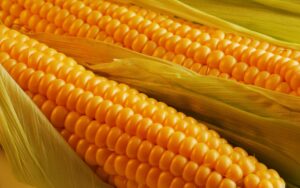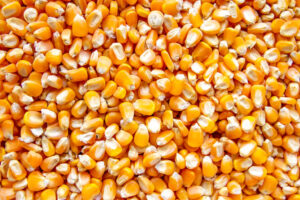
This week, the Ukrainian market continued to see a gradual decline in feed corn prices on a FOB Black Sea basis, according to the information and analytical agency APK-Inform.
“Prices remained under pressure throughout the week due to slow sea export rates as a result of systematic attacks by the Russian Federation on Ukraine’s port and energy infrastructure, which led to shipment disruptions, which, in turn, restrained importers’ demand,” analysts said.
At the same time, they noted that corn remains the most active export crop for Ukraine, but this has not been able to offset the factors putting pressure on prices.
Indicative bid/ask prices for feed corn with delivery in December-January from Black Sea ports fell by 1-3 USD/ton in less than a week under the influence of these factors to 210-218 and 214-222 USD/ton, respectively, according to APK-Inform.

The corn market is currently the most active segment of Ukrainian grain exports, ensuring stable port loading and constant demand from importers, according to the analytical cooperative “Pusk,” created within the framework of the All-Ukrainian Agrarian Council (VAR).
“Corn currently remains the only relatively active market segment. As of December 22, exports amounted to almost 1.5 million tons. Although these volumes are not record-breaking, shipments are stable, and it is corn that keeps most ports operating today,” analysts said.
According to their information, demand for corn on the world market remains high. Ukrainian corn remains in demand in EU countries, particularly in Spain and Italy, which are among the key buyers, as well as in Turkey.
At the same time, importers are closely monitoring the security situation in Ukraine.
“Importers are aware that the war is not expected to end quickly in the coming months and that risks to port infrastructure will remain. If exports from Ukraine are halted or significantly reduced, it will be difficult for the global market to quickly cover the possible deficit. American corn has already been contracted for January and almost entirely for February, so there are virtually no alternatives to Ukraine for supplies during this period,” experts said.
At the end of the week, spot corn prices rose to $207–208 per ton, while domestic contract prices rose to 9,800–9,850 UAH/ton.
“Further price dynamics will largely depend on the growth rate of logistics costs and security risks,” Pusk said.

To support exports of Ukrainian goods, the State Customs Service issued 1.5 million EUR.1 certificates for transportation starting January 1, 2016, with exporters of agricultural products being the main recipients, according to the agency’s press service.
The State Customs Service reminded that the presence of a EUR.1 transport certificate exempts Ukrainian goods from import duties when imported into the EU, EFTA, Montenegro, the United Kingdom and Northern Ireland, Georgia, and Israel.
According to its data, during 2025, Ukrainian producers received EUR.1 certificates mainly for the export of goods of plant origin, sunflower oil, white sugar, chicken meat, and natural honey.
The largest number of such certificates was issued for the supply of products to Poland (24%), Germany (18%), Romania (8%), Italy (5%), and the Czech Republic (5%).

Purchase prices for sunflower seeds in Ukraine have fallen due to the suspension of oil and meal exports as a result of the Russian strike on the oil extraction plant (OEP) in the port of Pivdennyi, according to the Electronic Grain Exchange.
According to the exchange, Ukrainian processors have sharply reduced their purchase prices for sunflower seeds due to damage to the vegetable oil transshipment terminal at the oil extraction plant, the suspension of maritime exports, and the increased risk of attacks on other plants.
“Purchase prices for sunflower seeds yesterday (Monday – IF-U) fell by 1,000-1,300 UAH/t to 27,000-27,500 UAH/t, or $560-570 per ton (excluding VAT) with delivery to the plant,” the exchange said.
Currently, processors have sufficient stocks of sunflower seeds, experts said, but the suspension of maritime exports will force them to reorient exports across the western border, as was the case in 2022, which will increase logistics costs.
As reported, on the night of December 22, the Russian army attacked the port and energy infrastructure of the Odesa region, resulting in containers with flour and oil catching fire. As a result of the attack on December 23 on the port infrastructure of Odesa, a ship flying the Lebanese flag, which was transporting Ukrainian soybeans, was also damaged.

Ukrproduct Group, a major Ukrainian producer of packaged butter and processed cheese, maintained stable production levels at its main production sites in January-September 2025 and implemented business continuity protocols that had been refined since the start of the full-scale invasion.
“Exports accounted for 20.4% of total sales, strengthening the group’s position as one of Ukraine’s leading dairy exporters,” the company said in a report published on the London Stock Exchange on Thursday.
At the same time, processed cheese production volumes fell by 8.5%, which the company attributed to lower demand in the domestic market.
At the same time, Ukrproduct’s sales of processed cheese products increased by 8.1% due to consumers switching to cheaper alternatives. Sales of butter on the domestic market declined due to a significant decrease in profitability, but overall they increased by 25.8% due to exports.
The increase in exports of spreads boosted sales of spreads by 5% and sales of skimmed milk powder and skimmed milk products by 74.7%.
At the same time, kombucha sales increased by 30.6%, while kvass sales decreased by 13.3% due to cooler summer weather and a reduction in the number of keg sales outlets, the company explained.
During the period in question, Ukrproduct increased its sales of sunflower seeds more than fourfold, which it attributed to the diversification of its product range.
“Profitability remained under pressure due to dependence on diesel fuel, product spoilage, inflation in raw material prices, rising personnel costs, and continued instability in the energy sector,” the company said.
Ukrproduct Group is a large Ukrainian producer of packaged oil, processed cheese, and kvass. It produces dairy products under the trademarks Nash Molokhnik, Nash Sirok, Molendam, and Vershkovaya Dolina, as well as kvass under the trademark Arsenyevsky.
Ukrproduct Group consists of two plants in Zhytomyr (one specializing in processed cheese, the other producing kvass), as well as two enterprises in the Khmelnytskyi region: a milk plant in Starokostiantyniv, which produces packaged butter, spreads, cheese, and dry milk, and a dairy plant in Letychiv.
The group’s production facilities have the capacity to produce up to 70,000 tons of dairy products per year.

In January-November this year, Ukraine reduced manganese ore exports by 60.8% compared to the same period last year, to 17,592 thousand tons, but in August-November, it stepped up deliveries.
According to statistics released by the State Customs Service (SCS) on Friday, while deliveries in the first seven months of 2025 amounted to 2,977 thousand tons, exports more than doubled in August, when 5,037 thousand tons were exported, 1,725 thousand tons in September, 3,993 thousand tons in October, and 3,860 thousand tons in November.
In monetary terms, exports for the 11 months of 2025 fell by 56.7% compared to the same period in 2024, to $2.843 million. At the same time, the main exports were to Slovakia (99.02% of shipments in monetary terms) and Poland (0.98%).
During this period, the country imported 37,006 thousand tons worth $5.546 million from Ghana, with all deliveries taking place in November. In the first 11 months of 2024, 84,275 thousand tons of ore worth $18.212 million were imported.
As reported, in January 2024, Ukraine exported 44,903 tons of manganese ore worth $6.563 million to the US, ending a two-year hiatus in exports to foreign markets. In February-December 2024, there were no exports of manganese ore.
At the same time, for the whole of 2024, the country imported 84,293 thousand tons worth $18.302 million from Ghana (98.85%), Brazil (0.99%), and Belgium (0.11%). There were no imports in October-November.
Ukraine did not export manganese ore in 2022 and 2023, and in 2021, it exported 770 tons worth $89 thousand.
In addition, it was reported that the Pokrovsky Mining and Processing Plant (PGZK, formerly Ordzhonikidze Mining and Processing Plant) and the Marganetsky Mining and Processing Plant (MGZK, both in Dnipropetrovsk region), which are part of the Privat Group, stopped mining and processing raw manganese ore in late October-early November 2023, while NZF and ZZF stopped smelting ferroalloys. In the summer of 2024, ferroalloy plants resumed production.
PGZK and MGZK did not produce any products in 2024, while in 2023, PGZK produced 160.31 thousand tons of manganese concentrate, and MGZK was idle.
In Ukraine, manganese ore is mined and enriched by the Pokrovsky and Marganetsky mining and enrichment plants.
The consumers of manganese ore are ferroalloy enterprises.